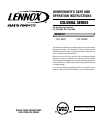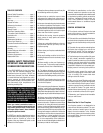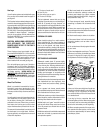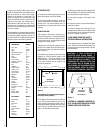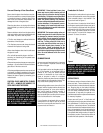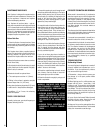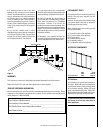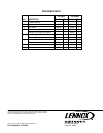
4
NOTE: DIAGRAMS & ILLUSTRATIONS NOT TO SCALE.
Figure 3
Figure 2
The appliance flue damper must always re-
main open when operating.
3. The grate in the firebox should be centered
on or over the bottom hearth so your fire can
breath properly. Crumble and twist plenty of
newspapers UNDER the grate and criss-cross
some small dry kindling sticks on top of the
paper or on the bottom of the grate.
HARDWOODS DENSITY
Alser, Red .41
Ash .49-.60
Aspen .38-.39
Basswood, American .37
Beech, American .64
Birch .55-.65
Butternut .38
Cherry, Black .50
Chestnut, American .43
Cottonwood .34-.40
Elm .60.63
Hackberry .53
Hickory, Pecan .60.66
Hickory, True .69-.75
Honey locust .66 (est.)
Locust, Black .69
Magnolia .48-.50
Maple .48-.63
Oak, Red .59-.67
Oak, White .64-.88
Poplar .42
Sassafras .42
Sweet gum .52
Sycamore, American .49
Tanoak .64 (est.)
Tupelo .50
Walnut, Black .55
Willow, Black .39
SOFTWOODS DENSITY
Bald cypress .46
Cedar .31-.47
Douglas Fir .46-.50
Fir .32-.43
Hemlock .40-.45
Larch, Western .52
Pine .39-.59
Redwood .35-.40
Spruce .35-.41
Tamarack .53
CAUTION: IF A SMOKING CONDITION EX-
ISTS, GLASS DOORS SHOULD BE CLOSED
DURING FIREPLACE OPERATION.
STARTING A FIRE
1. To start a fire in a the fireplace properly, first
check the operation of the flue damper.
2. To prevent smoking at start-up, close any
window located near the fireplace when first
lighting a fire. The closed windows may be
reopened once a chimney draft is drawn in the
fireplace.
DAMPER CONTROL
This fireplace is fitted with a manually con-
trolled chimney damper. The chimney damper
should be closed when the fireplace is not in
use to prevent cold air from entering the home
through the chimney system.
The damper is controlled through the use of a
control lever located within the firebox open-
ing at the top center just behind the firebox
lintel (
Figure 2
).
Push back and up (away from the front of the
fireplace) to lock the damper blade in the
OPEN position. To lock the damper in the
CLOSED position, the damper handle needs
to be pulled forward and up (towards the
front of the fireplace).
4. Build a pyramid of three split logs (split will
start much faster). Arrange the uneven wood to
provide plenty of air space between.
5. Now, light the paper at both sides of the
firebox.
6. Close the screens to prevent the escape of
sparks and embers.
7. Close the damper only when your fire is
completely out and ashes are cold. Keep closed
when fireplace is not in use to prevent unneces-
sary loss of heated or cooled air.
GLASS DOOR OPERATING SAFETY
PRECAUTIONS AND INSTRUCTIONS
These fireplaces may be equipped with glass
doors. Refer to the end of this document for a
listing of the glass doors approved for use with
these fireplaces.
However, most wood is sold by volume, not by
weight. To determine the best heating source,
look at the density of various wood types.
(Density is the weight for a given size.) The
higher the density, the more potential heat
output. A standard cord has a volume of 128
cubic feet. This figure also includes the air
space between and around the wood. The ac-
tual volume in a standard cord is between 60
and 100 cubic feet; depending on how tightly
the wood is packed.
Assuming that you are comparing two standard
cords of different species but the same volume
and moisture content, the denser species will
provide more BTU’s. The table of wood species/
densities reveals more helpful guidelines.
Fully Open or
Fully Closed
(Bi-Fold Doors)
WARNING: IF YOUR FIREPLACE IS
EQUIPPED WITH GLASS DOORS, IT
SHOULD BE OPERATED WITH THE DOORS
FULLY OPEN OR FULLY CLOSED. IF THE
DOORS ARE LEFT PARTIALLY OPEN, GAS
AND FLAMES MAY BE DRAWN OUT OF
THE OPENING, CREATING RISKS OF BOTH
FIRE AND SMOKE. REFER TO
FIGURE 3
FOR PROPER OPERATING CONDITIONS.
Damper
Open
Damper
Closed
Lintel
Combustion
Air Actuator



